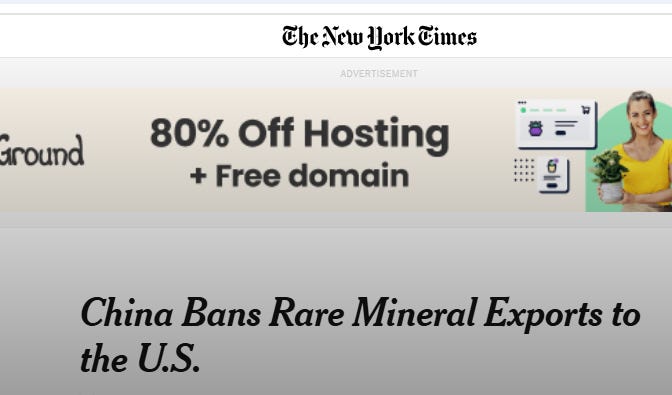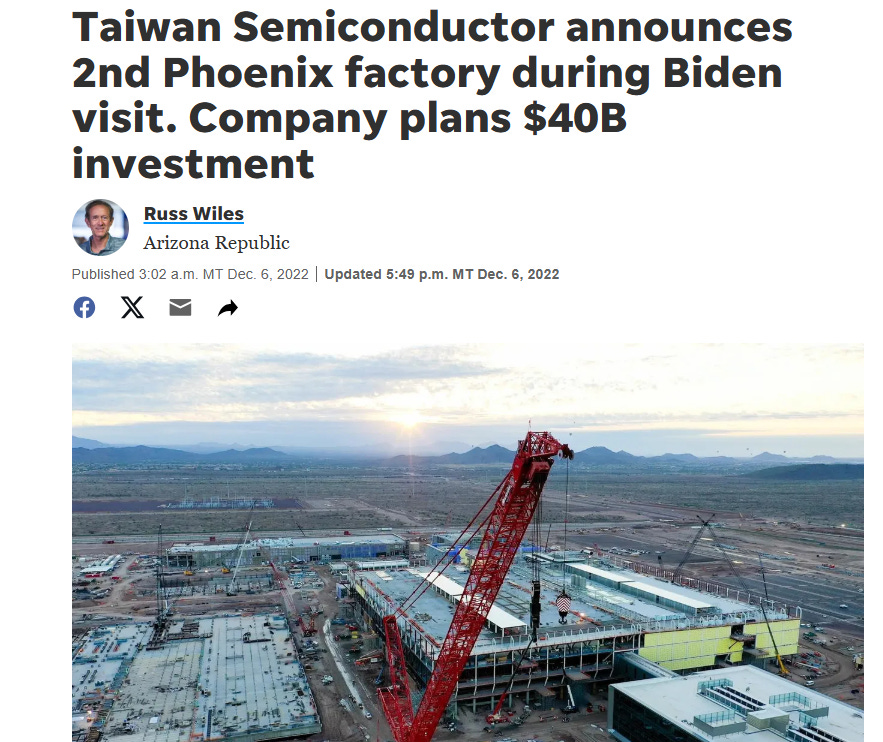China's Supply Chain Stranglehold: A Dire Warning for the West That Could Reshape Global Power Dynamics
China's Dominance in Global Supply Chains: A Wake-Up Call for the West
Op-Ed by Carmine Lombardi
In an increasingly interconnected world, China has quietly but effectively positioned itself as the linchpin of global supply chains across multiple critical sectors. This dominance poses significant challenges for Western nations, particularly the United States, as recent trade tensions have highlighted. Let's examine five key areas where China's control is particularly concerning.
Metals and Rare Earth Elements
China's stranglehold on rare earth elements and strategic metals is alarming. The country produces over 80% of the world's rare earth elements, crucial components in everything from smartphones to military equipment[1]. Recent actions by China to restrict exports of antimony, gallium, and germanium to the US underscore the vulnerability of Western supply chains[1]. These elements are vital for various applications, including batteries, missile guidance systems, and night-vision goggles. China's near-monopoly on neodymium-iron-boron magnets, essential for electric vehicles and wind turbines, further cements its position.
graphic by Robert Bryce
Active Pharmaceutical Ingredients (APIs)
The pharmaceutical industry's dependence on China is equally concerning. China produces approximately 80% of the world's APIs, the basic components needed to manufacture drugs. This includes common medications like aspirin and antibiotics, as well as more complex pharmaceuticals. The COVID-19 pandemic exposed the risks of this reliance, as supply chain disruptions led to shortages of critical medicines in many countries.
Medical Supplies and Personal Protective Equipment (PPE)
China's dominance in medical supplies became glaringly apparent during the COVID-19 pandemic. The country is the world's largest producer of medical devices, including syringes, hoses, and gloves. In the realm of PPE, China's manufacturing capacity dwarfs that of other nations, producing over 50% of the world's masks and a significant portion of other protective gear. This extends beyond medical applications to construction and industrial safety equipment.
Heavy Machinery and Vehicles
China's role in manufacturing heavy machinery and vehicles is growing rapidly. Chinese companies are increasingly competitive in producing earth-moving equipment, buses, trucks, and ships. The country's push into electric vehicles (EVs) is particularly noteworthy, with Chinese EV manufacturers like BYD challenging established Western automakers.
Electronics and Technology
Perhaps most crucially, China's control over the electronics and technology supply chain is near-absolute. From raw materials to finished products, China's influence is pervasive. The country produces a vast majority of the world's electronics, including crucial components for circuits, chips, and computing devices.
Moreover, Chinese tech giants like Huawei and ByteDance are increasingly outpacing their Western counterparts in innovation. Huawei's superiority in 5G technology is well-documented, with its equipment considered more advanced and cost-effective than alternatives from Nokia or Ericsson. In the consumer space, Huawei's latest tri-fold smartphone, the Mate X3, showcases technical prowess that surpasses even Apple's iPhone in terms of design and functionality.
ByteDance, the parent company of TikTok, has demonstrated its technological edge through its advanced AI algorithms, which have proven more engaging and addictive than those of US social media platforms.
The implications of China's supply chain dominance are profound. It gives Beijing significant economic leverage and potential geopolitical influence. The recent trade tensions between the US and China have exposed the vulnerabilities inherent in this dependence.
To address this challenge, Western nations must prioritize diversifying their supply chains, investing in domestic production capabilities, and fostering innovation. This will require a coordinated effort from governments, industries, and research institutions. The stakes are high, as continued reliance on China for critical supplies and technologies could have far-reaching consequences for economic security and national defense.
As we navigate an increasingly complex global landscape, addressing the imbalance in these crucial supply chains must be a top priority. The alternative – remaining at the mercy of a single dominant supplier – is a risk too great to ignore.
I'm with the government, and I'm here to help
The phrase "I'm with the government, and I'm here to help" is often cited as the "nine scariest words in the English language," a quote attributed to former President Ronald Reagan. This expression reflects a deep skepticism about government intervention and has been referenced in various contexts, highlighting concerns about bureaucracy and the potential negative impact of government actions.
Biden Regime tries to Prop up Taiwan Semiconductor, an Epic Failure
The Biden administration's celebration of TSMC's $40 billion investment in Phoenix, Arizona, for semiconductor manufacturing highlights a glaring contradiction. Semiconductor production is incredibly water-intensive, with a large fab consuming up to 4.8 million gallons of water daily.
This is equivalent to the annual water consumption of 60,000 people. The process requires ultrapure water, with 1,000 gallons of UPW consuming 1,400 to 1,600 gallons of municipal water.
Meanwhile, the Phoenix area is grappling with a severe structural drought. Lake Powell, a critical water source, has seen its levels drop to record lows, rebounding slightly in 2023 but remaining well below capacity.
The Colorado River basin, which supplies water to the region, has been experiencing a "megadrought" for over two decades.
Phoenix, already home to over 200 water-hungry golf courses, now faces additional strain from this semiconductor venture.
Despite the U.S. government's $6.6 billion subsidy to TSMC aimed at boosting domestic chip production, China continues to dominate the global semiconductor supply chain. This massive investment in a water-scarce region underscores the complex challenges in balancing economic development with environmental sustainability.
Mid term Exam for Common Sense 101:
What do you do when you make a huge error in judgment? (multiple choice)
1. Learn from your mistake?
or
2. Repeat the mistake?
OK you passed your mid term exam
The answer was 2. Learn from your Mistake
Here is your final exam
What do you do when you make a huge error in judgment two times consecutively (multiple choice)
1. Learn from your mistake and vow to never ever under any circumstances repeat the error in judgment 3 times in a row?
or
2. Repeat the mistake a third time?
The water usage projections for TSMC's facilities in Phoenix are alarming.
This substantial water demand in an already water-stressed region highlights the questionable nature of the location choice.
Despite these concerns, TSMC has not only proceeded with its initial plans but has also announced a third fab in Phoenix, bringing its total U.S. investment to over $65 billion
end of segment
You all know we are going to weave Pittsburgh into this story somehow right?
Extra Credit, Knowing semiconductor chips require enormous amounts of water where would you locate the manufacturing plant if you only have two choices ?
1. Phoenix Arizona ?
or
2. Pittsburgh Pennsylvania ?
Rivers in Pittsburgh
Allegheny River
Monongahela River
Ohio River
Youghiogheny River
Universities in Pittsburgh
Carnegie Mellon University
University of Pittsburgh
Duquesne University
Chatham University
Robert Morris University
Carlow University
University in Phoenix
Arizona State University (ASU)
Carnegie Mellon University has been instrumental in attracting major tech partnerships to Pittsburgh, solidifying the city's position as an AI and robotics hub. Nvidia selected Pittsburgh as its first "AI Tech Community," establishing joint technology centers with CMU and the University of Pittsburgh focused on robotics and health sciences.
Google has partnered with CMU for various initiatives, including the TechWise program and providing Google Workspace for Education. Honeywell collaborated with CMU to advance AI and robotics technologies for distribution centers, while also opening Honeywell Robotics in Pittsburgh's "Robotics Row." Additionally, CMU's partnerships extend to companies like PPG and startups such as Lovelace AI and Skild AI, further enriching Pittsburgh's tech ecosystem.
end of segment
What about Precious Metals
Russia has recently imposed a temporary ban on exporting waste and scrap of precious metals, including gold and silver, from December 1, 2024, to May 31, 2025.
This move aims to boost domestic processing capabilities and retain valuable resources within the country.
Meanwhile, China and Russia have been strategically accumulating gold and silver as part of their efforts to reduce dependence on the U.S. dollar.
This "dedollarization" strategy involves increasing their precious metal reserves while limiting exports, positioning themselves to challenge the dollar's global dominance in international trade and finance
not financial advice
our opinions are not sponsor opinions
editorial department is sole and separate from promotions department
Merry 12 days of Christmas and Happy New Year (2025 the year of Silver)









